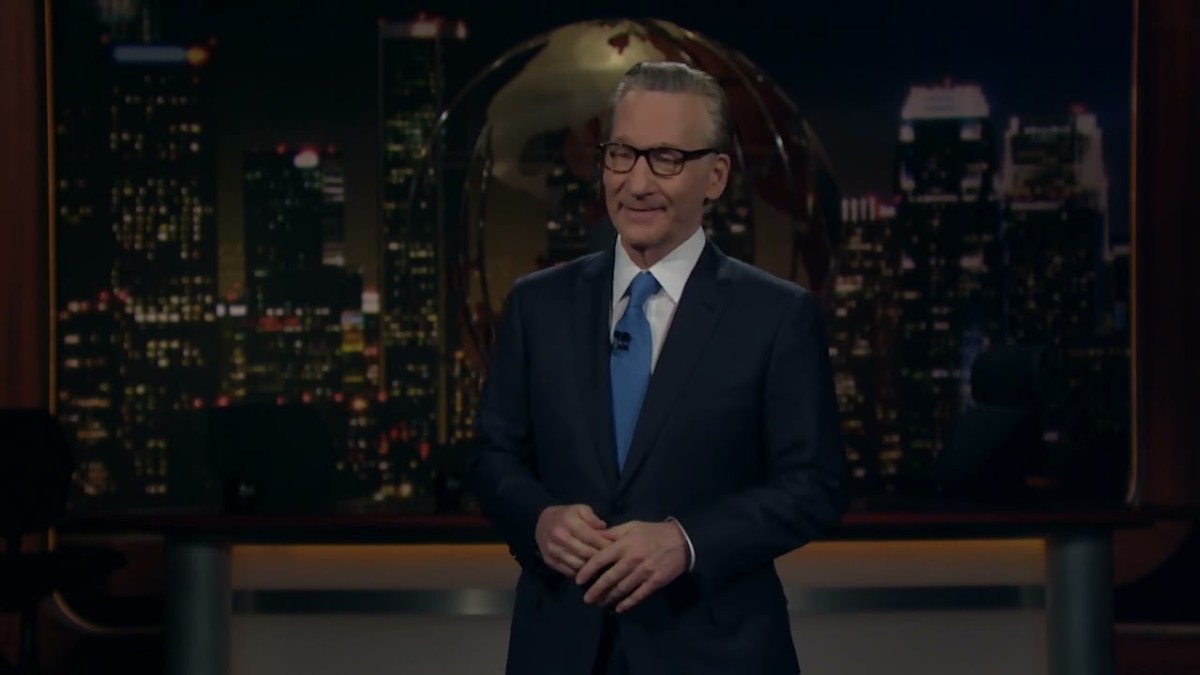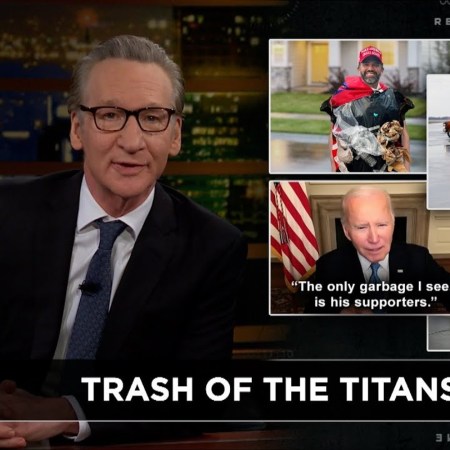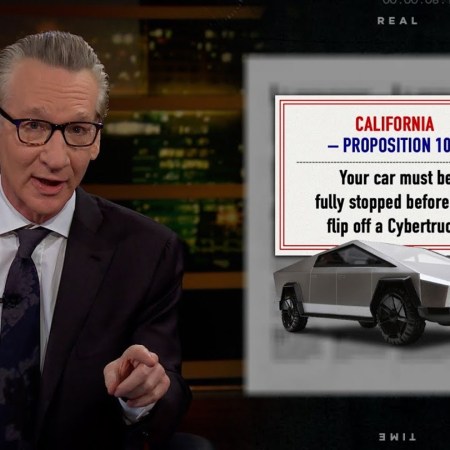This week’s Real Time With Bill Maher began with a monologue that touched on some of Maher’s preferred subjects for critique. There was Vladimir Putin, via Maher citing the array of high-profile Russians who have turned up dead in recent months. There was COVID-19, with Maher quipping, “If you’re wearing a mask, you’d better be robbing me.” (Why Maher feels personally affected by other people’s masking remains mysterious.) And there was some righteous anger at the recent devastation in Puerto Rico.
The upcoming midterm elections, and their proximity, gave Maher a window for some of the monologue’s most memorable lines. (“This used to be a real country,” he said at one point.) Of the self-described “prophet” campaigning with Pennsylvania gubernatorial candidate Doug Mastriano, Maher noted that “this story has everything evangelicals love: magic, bigotry and dessert.”
Filmmaker Michael Moore appeared on the show remotely from New York, wearing a Starbucks Workers United hat, seated in a room with a map, a video camera and a Ruth Bader Ginsberg action figure all visible behind him. “For the first time I can remember, the midterms are sexy,” Maher said. Moore emphasized showing up to the midterm elections and the importance of getting out the vote.
Moore spoke about his optimism that the midterm elections would be good for the Democrats, citing a number of factors — chief among them the Supreme Court’s Dobbs verdict. “As liberals, there’s all this whining that goes on,” he said. “We’ve got to stop this and recognize the power that we have right now.”
Nation of Victims author Vivek Ramaswamy and The Big Lie author Jonathan Lemire joined Maher for the panel discussion, which began with Maher bringing up the protests in Iran reacting to the death of Mahsa Amini. Ramaswamy also pointed to recent protests in Russia as indicative of a global reaction to authoritarian governments, a point Lemire agreed with.
Disagreement crept in when Ramaswamy argued about “a morality police arising in the United States.” Maher responded with no small amount of exasperation, pointing out that comparing arguments over cultural appropriation in the United States with the existence of literal morality police in Iran was fundamentally incorrect.
From there, the panel discussed immigration, in light of Ron DeSantis’s efforts to send migrants to Martha’s Vineyard — and, more broadly, to questions of national identity. And in the second half of the discussion, talk turned to the role of victimhood in American politics. Ramaswamy noted that he’s been critical of victimhood from the political left, while Lemire spoke about the rise of a politics of victimhood on the political right.
“As someone who’s more right of center, I’m disappointed in the convervative victimhood complex,” Ramaswamy said. “There’s no gold medal in the victimhood Olympics.”
This, in turn, led the panel to talk about the rise of victimhood across political divides. Ramaswamy suggested that intergenerational wealth transfers had something to do with it, while Lemire brought up his experiences of covering Donald Trump’s campaign and the way that perceptions of victimhood factored into his popularity. (Maher’s attempts to tie this in to the case of a trans teacher in Canada never really clicked, however.)
New Rules found Maher discussing the design issues of soy sauce packets and the length of Queen Elizabeth II’s funeral. The bulk of the segment, though, focused on dislike on a national level. “You don’t really love America if you hate half the people in it,” Maher said.
Maher then expanded on this point, pointing to the number of Republican politicians who have criticized various national institutions, and wondered why, exactly, they were so concerned with running for office in a country they plainly didn’t like. He was also critical of those on the American left who didn’t recognize the existence of societal progress — and made the case for political optimism, both in its own right and in terms of finding a way to electoral success.
Michael Moore wasn’t there to join the panel for Overtime, which opened with Lemire discussing disinformation surrounding the 2020 election, and elections more broadly. Lemire was critical of Republicans here, while Ramaswamy brought up Stacey Abrams — at which point Maher entered the debate, citing “whataboutism.”
“It’s not nearly as consequential as what’s going on in the Republican Party,” Maher said. “It’s a giant problem that exists almost exclusively on one side.” And from there, Maher and Ramaswamy engaged in a heated debate over threats to democracy — and whether or not that was a partisan issue. Maher held fast in his argument that this was an issue for the Republican Party.
“Voting is not a fetish,” Maher said. It was another instance of Overtime having some of the most engaging moments of the episode, and it all came to a close with Maher talking about raisins. Which was a strange note to end on, but then, it’s also a strange time for American politics.
Thanks for reading InsideHook. Sign up for our daily newsletter and be in the know.


















